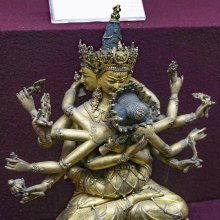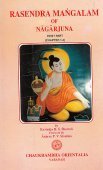Samaja, Samāja, Sāmaja, Saman-ja: 17 definitions
Introduction:
Samaja means something in Hinduism, Sanskrit, the history of ancient India, Marathi, Jainism, Prakrit, Hindi. If you want to know the exact meaning, history, etymology or English translation of this term then check out the descriptions on this page. Add your comment or reference to a book if you want to contribute to this summary article.
Images (photo gallery)
In Hinduism
Purana and Itihasa (epic history)
Source: archive.org: Shiva Purana - English TranslationSamāja (समाज) refers to the “retinue (of Viṣṇu)”, according to the Śivapurāṇa 2.3.36 (“The statements of the seven sages”).—Accordingly, after Śiva spoke to the Seven Sages: “On hearing these words in a worldly vein uttered by Śiva they laughingly replied to Sadāśiva, lord of the gods. The sages said:—‘Please invite and summon Viṣṇu with his retinue (sa-samāja), Brahmā with his sons, lord Indra, all the sages, Yakṣas, Gandharvas, Kinnaras, Siddhas, Vidyādharas, heavenly nymphs and others. All of them will jointly accomplish everything for you. There is no doubt about it’”
Source: Cologne Digital Sanskrit Dictionaries: The Purana Index1) Samāja (समाज).—Of Gods at Meru; visited by the Earth.*
- * Viṣṇu-purāṇa V. 1. 12.
2) Sāmaja (सामज).—See Nāgas.*
- * Brahmāṇḍa-purāṇa III. 7. 351.

The Purana (पुराण, purāṇas) refers to Sanskrit literature preserving ancient India’s vast cultural history, including historical legends, religious ceremonies, various arts and sciences. The eighteen mahapuranas total over 400,000 shlokas (metrical couplets) and date to at least several centuries BCE.
Ayurveda (science of life)
Veterinary Medicine (The study and treatment of Animals)
Source: Shodhganga: Portrayal of Animal Kingdom (Tiryaks) in Epics An Analytical studySāmaja (सामज) is a synonym (another name) for the Elephant (Gaja), according to scientific texts such as the Mṛgapakṣiśāstra (Mriga-pakshi-shastra) or “the ancient Indian science of animals and birds” by Hamsadeva, containing the varieties and descriptions of the animals and birds seen in the Sanskrit Epics such as the Ramayana and Mahabharata.

Āyurveda (आयुर्वेद, ayurveda) is a branch of Indian science dealing with medicine, herbalism, taxology, anatomy, surgery, alchemy and related topics. Traditional practice of Āyurveda in ancient India dates back to at least the first millenium BC. Literature is commonly written in Sanskrit using various poetic metres.
India history and geography
Source: Cologne Digital Sanskrit Dictionaries: Indian Epigraphical GlossarySamāja.—(EI 20; CII 1), a fair; a festival; a festive gather- ing on a particular occasion or for the celebration of an event. Note: samāja is defined in the “Indian epigraphical glossary” as it can be found on ancient inscriptions commonly written in Sanskrit, Prakrit or Dravidian languages.

The history of India traces the identification of countries, villages, towns and other regions of India, as well as mythology, zoology, royal dynasties, rulers, tribes, local festivities and traditions and regional languages. Ancient India enjoyed religious freedom and encourages the path of Dharma, a concept common to Buddhism, Hinduism, and Jainism.
Languages of India and abroad
Marathi-English dictionary
Source: DDSA: The Molesworth Marathi and English Dictionarysamaja (समज).—f m ( H) Apprehension of in the judgment; understanding, discernment. v ghē, dhara, 2 Understanding, sense, power of apprehending. 3 (Usually samajī or samajūta) Right understanding of, with, or towards; convinced, persuaded, or pacified state.
--- OR ---
samāja (समाज).—m (S) An assembly or a multitude; a number as collected together or as viewed collectively.
Source: DDSA: The Aryabhusan school dictionary, Marathi-Englishsamaja (समज).—f m Understanding; sense. Warn- ing, admonition, reproof.
--- OR ---
samāja (समाज).—m An assembly or a multitude. The society. samājaśāstra n sociolgy.
Marathi is an Indo-European language having over 70 million native speakers people in (predominantly) Maharashtra India. Marathi, like many other Indo-Aryan languages, evolved from early forms of Prakrit, which itself is a subset of Sanskrit, one of the most ancient languages of the world.
Sanskrit dictionary
Source: DDSA: The practical Sanskrit-English dictionarySamaja (समज).—
1) A multitude of beasts, animals or birds, a herd, flock; आविश्चकार समजोऽपि तदा पशूनां भावं मनोभवकृतं दयितानुवर्ती (āviścakāra samajo'pi tadā paśūnāṃ bhāvaṃ manobhavakṛtaṃ dayitānuvartī) Rām. ch.5.12; (cf. paśūnāṃ samajo'nyeṣāṃ samājo'tha sadharmiṇām).
2) A number of fools.
-jam A wood, forest.
Derivable forms: samajaḥ (समजः).
--- OR ---
Samāja (समाज).—
1) An assembly, a meeting; अयं समाजः सुमहान् रमणीयतमो भुवि (ayaṃ samājaḥ sumahān ramaṇīyatamo bhuvi) Mahābhārata (Bombay) 1.143.3; विशेषतः सर्वविदां समाजे विभूषणं मौनमपष्टितानाम् (viśeṣataḥ sarvavidāṃ samāje vibhūṣaṇaṃ maunamapaṣṭitānām) Bhartṛhari 2.7.
2) A society, club, an association; ... समाजानुरतो जनः (samājānurato janaḥ) Bhaṭṭikāvya 8.39 (cf. paśūnāṃ samajo- 'nyeṣāṃ samājo'tha sadharmiṇām); Manusmṛti 9.264.
3) A number, multitude, collection.
4) A party, convivial meeting,
5) An elephant.
6) Meeting with, falling in with; तेषां विभो समुचितो भवतः समाजः (teṣāṃ vibho samucito bhavataḥ samājaḥ) Bhāgavata 1.6.38.
Derivable forms: samājaḥ (समाजः).
--- OR ---
Sāmaja (सामज).—a.
1) produced by the Sāmaveda.
2) produced by conciliatory means.
-jaḥ, -taḥ an elephant; नानाविधाविष्कृतसामजस्वरः (nānāvidhāviṣkṛtasāmajasvaraḥ) Śiśupālavadha 12.11; दन्ता दन्तैराहताः सामजानां भङ्गं जग्मुर्न स्वयं सामजाताः (dantā dantairāhatāḥ sāmajānāṃ bhaṅgaṃ jagmurna svayaṃ sāmajātāḥ) 18.33.
Sāmaja is a Sanskrit compound consisting of the terms sāman and ja (ज). See also (synonyms): sāmajāta.
Source: Cologne Digital Sanskrit Dictionaries: Shabda-Sagara Sanskrit-English DictionarySamaja (समज).—m.
(-jaḥ) 1. A multitude of beasts or birds. 2. A number of blockheads. n.
(-jaṃ) A forest, a wood. E. sama alike, jan to be born, ḍa aff.
--- OR ---
Samāja (समाज).—m.
(-jaḥ) 1. A multitude, a number, (of anything except beasts.) 2. An assembly, a meeting. 3. A convivial meeting, a club. 4. An elephant. E. sam like, and aj to go, aff. ghañ .
--- OR ---
Sāmaja (सामज).—mfn.
(-jaḥ-jā-jaṃ) Producing from or produced by the Sama-Veda. m.
(-jaḥ) An elephant. E. sāma the Veda, ja born; also sāmajāta, &c.
Source: Cologne Digital Sanskrit Dictionaries: Benfey Sanskrit-English DictionarySamaja (समज).—[sam-aj + a], I. m. 1. A multitude of beasts. 2. A number of blockheads. Ii. n. A forest.
--- OR ---
Samāja (समाज).—i. e. sam-aj + a, m. 1. A multitude, Mahābhārata 1, 5698; a number. 2. An assembly, [Pañcatantra] 158, 7. 3. A convivial meeting. 4. An elephant.
--- OR ---
Sāmaja (सामज).—I. i. e. sāman + ja, adj. Producing from or produced by the Sāma-Veda. Ii. m. An elephant.
Source: Cologne Digital Sanskrit Dictionaries: Cappeller Sanskrit-English DictionarySamaja (समज).—[adjective] [Epithet] of Indra.
--- OR ---
Samāja (समाज).—[masculine] assembly, company, meeting, heap, multitude.
Source: Cologne Digital Sanskrit Dictionaries: Monier-Williams Sanskrit-English Dictionary1) Samaja (समज):—[=sam-aja] [from sam-aj] m. Name of Indra, [Aitareya-āraṇyaka]
2) [v.s. ...] a multitude of animals, [cf. Lexicographers, esp. such as amarasiṃha, halāyudha, hemacandra, etc.]
3) [v.s. ...] a number of fools, [cf. Lexicographers, esp. such as amarasiṃha, halāyudha, hemacandra, etc.]
4) [v.s. ...] n. a forest, wood, [cf. Lexicographers, esp. such as amarasiṃha, halāyudha, hemacandra, etc.]
5) Samāja (समाज):—[=sam-āja] [from sam-aj] a m. meeting with, falling in with ([genitive case] or [compound]), [Varāha-mihira’s Bṛhat-saṃhitā; Bhāgavata-purāṇa]
6) [v.s. ...] a meeting, assembly, congregation, congress, conclave, society, company (cf. dyūta-s), association, collection ([according to] to [cf. Lexicographers, esp. such as amarasiṃha, halāyudha, hemacandra, etc.] not applied to animals), [Āpastamba; Manu-smṛti; Mahābhārata] etc.
7) [v.s. ...] a convivial meeting, party, club, [Horace H. Wilson]
8) [v.s. ...] a quantity, plenty, abundance (in sukha-s), [Gīta-govinda xi, 21]
9) [v.s. ...] a [particular] conjunction of planets, [Varāha-mihira’s Bṛhat-saṃhitā]
10) [v.s. ...] an elephant ([probably] [wrong reading] for sāmaja), [cf. Lexicographers, esp. such as amarasiṃha, halāyudha, hemacandra, etc.]
11) [=sam-āja] b etc. See sam-√aj, p.1153.
12) Sāmaja (सामज):—[=sāma-ja] [from sāma > sāman] mfn. occurring in the S°, [Śiśupāla-vadha]
13) [v.s. ...] m. an elephant, [cf. Lexicographers, esp. such as amarasiṃha, halāyudha, hemacandra, etc.]
Source: Cologne Digital Sanskrit Dictionaries: Yates Sanskrit-English Dictionary1) Samaja (समज):—[sama-ja] (jaḥ) 1. m. A multitude of beasts or blockheads. n. A forest.
2) Samāja (समाज):—(jaḥ) 1. m. A multitude, an assembly; a club; an elephant.
3) Sāmaja (सामज):—[sāma-ja] (jaḥ) 1. m. An elephant. a. From or by the Sāma Veda.
Source: DDSA: Paia-sadda-mahannavo; a comprehensive Prakrit Hindi dictionary (S)Samāja (समाज) in the Sanskrit language is related to the Prakrit words: Samāja, Samāya.
[Sanskrit to German]
Sanskrit, also spelled संस्कृतम् (saṃskṛtam), is an ancient language of India commonly seen as the grandmother of the Indo-European language family (even English!). Closely allied with Prakrit and Pali, Sanskrit is more exhaustive in both grammar and terms and has the most extensive collection of literature in the world, greatly surpassing its sister-languages Greek and Latin.
Hindi dictionary
Source: DDSA: A practical Hindi-English dictionarySamāja (समाज) [Also spelled samaj]:—(nm) society; community; -[nirapekṣa] non-social; -[nirapekṣatā] the state or fact of being non-social, independent of the society; ~[vāda] socialism; ~[vādī] a socialist; socialistic; •[rājya] socialistic state; ~[vādī vyavasthā] socialistic order; -[viṣayaka/sambandhī] social; -[vyavasthā] social order; ~[śāstra] Sociology; ~[śāstrajña/śāstrī] a sociologist; ~[śāstrīya] sociological; -[sudhāra] social reform/uplift; -[sudhāraka] social reformer; —[sevaka] a social worker; —[sevā] social service; -[sevikā] a female social worker; -[sevī] rendering social service, social worker.
...
Prakrit-English dictionary
Source: DDSA: Paia-sadda-mahannavo; a comprehensive Prakrit Hindi dictionarySamāja (समाज) in the Prakrit language is related to the Sanskrit word: Samāja.
Prakrit is an ancient language closely associated with both Pali and Sanskrit. Jain literature is often composed in this language or sub-dialects, such as the Agamas and their commentaries which are written in Ardhamagadhi and Maharashtri Prakrit. The earliest extant texts can be dated to as early as the 4th century BCE although core portions might be older.
Kannada-English dictionary
Source: Alar: Kannada-English corpusSamaja (ಸಮಜ):—[noun] a number of animals feeding, living or being driven together.
--- OR ---
Samāja (ಸಮಾಜ):—
1) [noun] a large gathering of people, animals, etc.; a multitude.
2) [noun] a collection of objects laid on top of each; a heap.
3) [noun] a formal gathering of a number of persons for purpose of discussion, announcement, etc.
4) [noun] a group of persons regarded as forming a single community, esp. as forming a distinct social or economic class; a society.
5) [noun] the system or condition of living together as a community in such a group; a society.
6) [noun] all people, collectively, regarded as constituting a community of related, interdependent individuals; a society.
7) [noun] any organised group of people joined together because of work, interests, etc. in common; a society.
8) [noun] a body of persons organised for some specific purpose, as a club, union or society.
--- OR ---
Sāmaja (ಸಾಮಜ):—[adjective] of or relating to Samavēda.
--- OR ---
Sāmaja (ಸಾಮಜ):—
1) [noun] the result of compromise, reconciliation, etc.
2) [noun] an elephant.
Kannada is a Dravidian language (as opposed to the Indo-European language family) mainly spoken in the southwestern region of India.
See also (Relevant definitions)
Partial matches: Ja, Sam, Aja, Cama, Sama, Saman.
Starts with (+37): Camajam, Sama Jataka, Samaajawaadee, Samaajawaadee-vyavastha, Samaja-sarpa, Samajaateey, Samajadara, Samajadhishvara, Samajadhishwar, Samajadroha, Samajadrohi, Samajaghatuka, Samajaghatukate, Samajajivi, Samajaka, Samajakalyana, Samajakamtaka, Samajakamtaki, Samajako-khandatmaka-vibhajana, Samajako-shrenikrama-vibhajana.
Ends with (+11): Agisamaja, Amarasamaja, Arthasamaja, Aryasamaja, Asamaja, Brahmasamaja, Devasamaja, Dyutasamaja, Giriyagrasamaja, Giryagrasamaja, Golasamaja, Gosamaja, Guhyasamaja, Janasamaja, Kshamaja, Lokasamaja, Madhyavitta-samaja, Mahasamaja, Murkhasamaja, Nasamaja.
Full-text (+57): Samajika, Prekshasamaja, Dyutasamaja, Samajam, Samaya, Samaji, Samajasamniveshana, Camajam, Samajya, Samodbhava, Komkara, Murkhasamaja, Naphanukasana, Satyarthaprakasa, Sukhasamaja, Camacu, Prekshaka, Yadavasamaja, Shasak, Prekshak.
Relevant text
Search found 25 books and stories containing Samaja, Samāja, Sāmaja, Saman-ja, Sāman-ja, Sam-aja, Sam-āja, Sama-ja, Sāma-ja; (plurals include: Samajas, Samājas, Sāmajas, jas, ajas, ājas). You can also click to the full overview containing English textual excerpts. Below are direct links for the most relevant articles:
Amarakoshodghatana of Kshirasvamin (study) (by A. Yamuna Devi)
Fauna (12): Synonyms added by Kṣīrasvāmin < [Chapter 5 - Aspects of Nature]
Fauna (5): Domesticated Animals (a): Elephants < [Chapter 5 - Aspects of Nature]
Rig Veda (translation and commentary) (by H. H. Wilson)
Rig Veda 6.25.9 < [Sukta 25]
Blue Annals (deb-ther sngon-po) (by George N. Roerich)
Chapter 2 - Guhyasamāja-tantra system of Noble Nāgārjuna < [Book 7 - The preaching of the Tantras]
Chapter 2 - Guhyasamāja Marpa system < [Book 8 - The famous Dakpo Kagyü (traditions)]
Chapter 2 - Spa tshab together with his lineage < [Book 6 - The Origin of the Mādhyamika (middle way)]
Chaitanya Bhagavata (by Bhumipati Dāsa)
Verse 1.10.3 < [Chapter 10 - Marriage with Śrī Lakṣmīpriyā]
Verse 2.1.3 < [Chapter 1 - The Beginning of the Lord’s Manifestation and His Instructions on Kṛṣṇa-saṅkīrtana]
Verse 2.7.6 < [Chapter 7 - The Meeting of Gadādhara and Puṇḍarīka]
Kamashastra Discourse (Life in Ancient India) (by Nidheesh Kannan B.)
10. Erotic Culture < [Chapter 1 - Rise of Urbanization and Luxury Life in India]
4. Advent of Kāmaśāstra < [Chapter 5 - Looking for Alternatives: Possibilities in Kāmaśāstra]
7. Positioning Kāmaśāstra in the Festive Scenario of Early Urban India < [Chapter 1 - Rise of Urbanization and Luxury Life in India]
Brihat Samhita (by N. Chidambaram Iyer)
Related products


